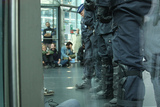
2009-10-28
By Jennifer Rankin
Activists disrupt business conference on climate change.
Police arrested 24 climate activists this morning after they disrupted a business conference on climate change being held in a European Commission building.
Activists from the Climate Alarm group arrived at the Charlemagne building just before 9am, blocked the main doors with chains and barred people from entering and leaving the building. On the street outside, campaigners banged drums and raised a banner with the message ‘Our climate, not your business’.
Today’s one-day conference is organised by BusinessEurope, the employers’ federation, and sponsored by companies including Shell, ArcelorMittal, BASF and Lafarge.

The doors re-opened at 10.30am after police broke up the demonstration. Minor scuffles took place near the entrance when activists refused to move away from the doors and eventually pepper-spray was used to disperse them. Police arrested 24 people (20 men and four women). The police had not been informed beforehand of the protest.
The action was organised by Climate Alarm, a Belgian-Dutch group that is not affiliated to any of the big climate campaign groups. The group was founded in the summer and its members come from Belgium, the Netherlands and Germany.
Anna Martin, a spokeswoman for Climate Alarm, said the group objected to the fact that the Commission was hosting the conference for free. “There is way too much corporate lobbying and business should not have a role in climate talks,” she said.
José Manuel Barroso, the Commission president, will today make a speech at the conference, while two commissioners, Stavros Dimas (environment) and Günter Verheugen (industry) are also taking part in debates. Senior commission civil servants, business leaders, one NGO and one trade unionist are also speaking on the panels.
The conference started despite the disruption outside, although it was delayed by 15 minutes. Jos Delbeke, deputy director-general at the Commission’s environment department, was late for his panel discussion because of the protest. Some speakers were able to get in via a back entrance through the underground car-park.
Outside, the delegates left standing in the autumn sunshine said that it was fair that the group could protest, although some disagreed with their methods.
“I don’t see how this helps with the discussion,” said Christian Taillebois of the European Atomic Forum (Foratom), which represents the nuclear industry. “They could register, they could make their voices heard in a different way, in a more respectful way.”
One delegate from the European Parliament asked: “If it is not the business of business, then who is going to pay?”
But others thought that the protesters had a fair point. “I can understand that some more concerned citizens get angry when they see the positions taken by BusinessEurope,” said Claude Turmes, a Green Luxembourgeois MEP who is speaking at the conference.
“I think it is good,” said one civil servant who works in the building. “The only problem is that there is not enough media here.”
A spokesman from BusinessEurope declined to comment.